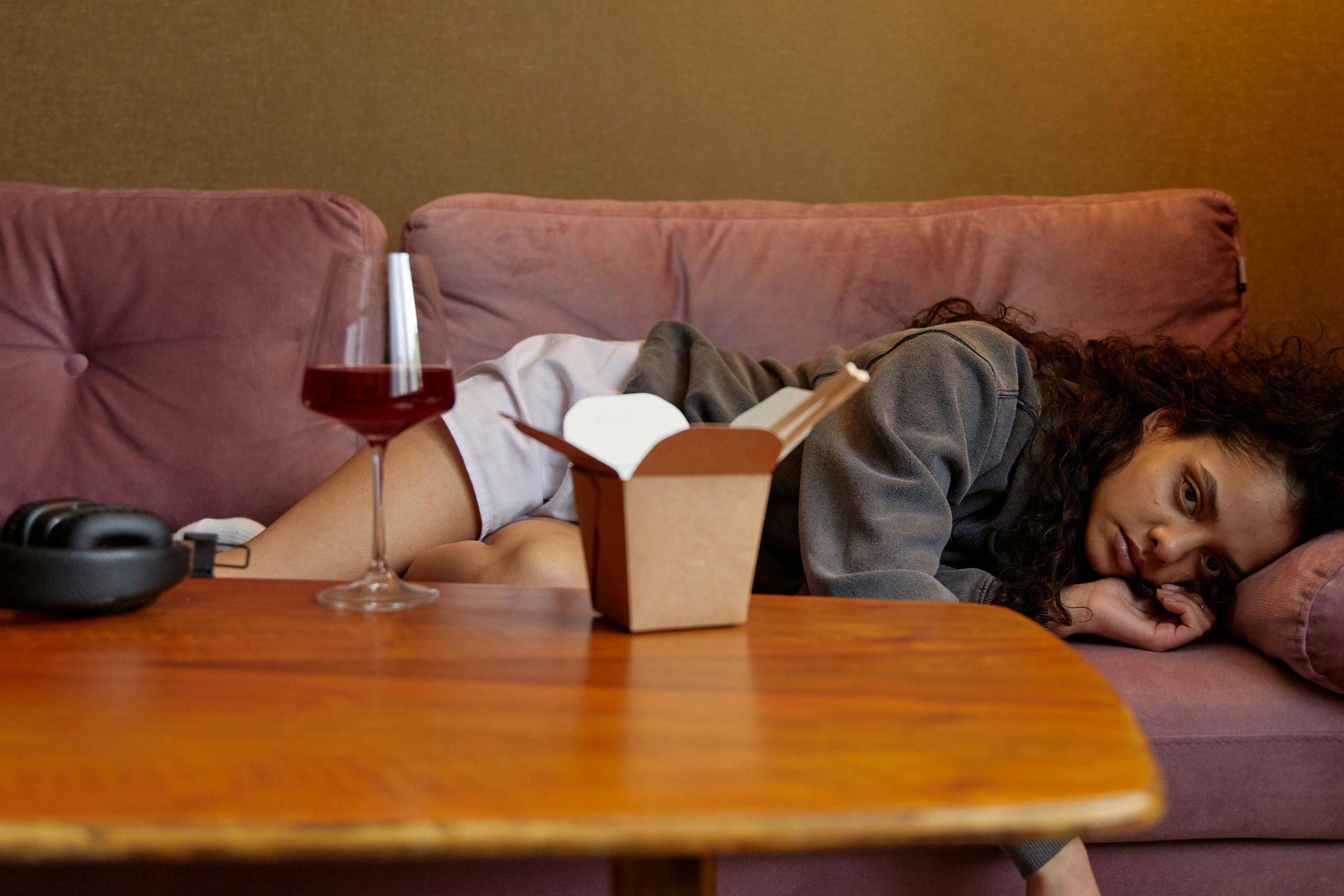Disclaimer: This website provides health information for educational purposes only and is not a substitute for professional medical advice, diagnosis, or treatment. Always seek the guidance of a qualified healthcare provider with any questions you may have.
We’ve all been there: after finishing a hearty meal, you might feel the urge to lie down and relax. It sounds like a natural way to unwind, but is it actually good for your body? Lying down after eating is something many people do, but it may not be the healthiest habit. In this article, we’ll explore why lying down after eating can have negative effects on your health, including the risk of acid reflux, poor digestion, and even sleep disturbances. Plus, we’ll provide some tips on how to relax without harming your body, so you can still enjoy your meals and rest without the discomfort.
- Why Do We Feel the Urge to Lie Down After Eating?
- The Risks of Lying Down After Eating
- How Lying Down After Eating Affects Your Posture
- The Relationship Between Lying Down and Weight Gain
- What Happens When You Lie Down After Eating?
- When is Lying Down After Eating Safe?
- Healthy Alternatives to Lying Down After Eating
- How Long Should You Wait to Lie Down After Eating?
- Conclusion
Why Do We Feel the Urge to Lie Down After Eating?
Lying down after eating feels comfortable, and it may be because our bodies naturally enter a “resting state” after a large meal. When we eat, our bodies go into a process called digestion, where food is broken down in the stomach and absorbed into the bloodstream. After digestion, our energy levels may dip, leading us to feel tired. Additionally, the hormone called insulin rises after eating, which can also make us feel more relaxed and sleepy.
For these reasons, many people instinctively feel like lying down after a big meal to give their body a break. However, while resting seems like the natural thing to do, there are risks to this habit that are worth considering.
The Risks of Lying Down After Eating
1. Acid Reflux and Heartburn
One of the most common problems caused by lying down after eating is acid reflux. When you lie down, gravity no longer helps keep stomach acid where it belongs—in the stomach. Instead, the acid can flow backward into the esophagus, leading to a burning sensation in the chest or throat, known as heartburn. This condition is especially likely if you eat spicy, fatty, or acidic foods.
Acid reflux can also lead to gastroesophageal reflux disease (GERD), a more severe and chronic form of acid reflux. GERD can cause frequent discomfort and complications if left untreated.
2. Slower Digestion
Your digestive system works more efficiently when you’re upright. When you lie down, your body has to work harder to break down food, which can slow the digestion process. This may cause bloating, discomfort, or even constipation. Eating a large meal and then lying down may increase the time it takes for your stomach to empty, leading to feelings of fullness and heaviness.
3. Sleep Disturbances
Lying down immediately after eating can also interfere with your sleep, especially if you eat too close to bedtime. Your body is still focused on digesting food, which can prevent you from falling into a deep sleep. The discomfort from acid reflux or bloating can make it harder to sleep soundly, and in some cases, you may experience disturbed sleep throughout the night.
How Lying Down After Eating Affects Your Posture
Your posture is important for overall health, and lying down right after eating can contribute to poor posture habits. When you lie flat, your body doesn’t get the chance to maintain its natural alignment, especially after eating a large meal. This can put strain on your spine and contribute to discomfort. Additionally, lying down often leads to slouching or curling up, which further affects your posture. Maintaining good posture while eating and resting afterward can help reduce strain on your body.
Instead of lying down after eating, consider sitting with your back supported in a chair or propping yourself up in bed with pillows. These positions help maintain a more neutral posture, which supports spinal health and avoids muscle strain. Keeping good posture not only helps digestion but also promotes better overall body mechanics, preventing back pain or discomfort.
The Relationship Between Lying Down and Weight Gain
A common concern among people is whether lying down after eating can contribute to weight gain. While lying down itself does not directly cause weight gain, the habit may contribute indirectly. For example, if you frequently lie down after eating large meals, you may be less likely to engage in physical activity, which could lead to weight gain over time.
When you remain inactive after eating, your metabolism slows down, and the body is not as efficient at burning calories. Additionally, constantly lying down and overeating can lead to an overall decrease in physical activity. To prevent weight gain, it’s essential to stay active throughout the day and avoid sedentary habits right after meals. Instead of lying down, try to incorporate light exercises or activities like walking to keep your metabolism active and support healthy digestion.
What Happens When You Lie Down After Eating?
Lying down after eating causes several physical changes in your body, mainly related to digestion. When you are upright, gravity helps push food through your digestive system. However, when you lie flat, this process can be hindered. The stomach acids may move upward instead of staying where they are needed, leading to discomfort and digestive issues.
Additionally, when you eat a large meal and then rest, your body has to work harder to break down and process that food. This can make you feel sluggish or tired. Your body’s energy is going toward digestion, and lying down can make it even harder to efficiently process the food.
When is Lying Down After Eating Safe?
While lying down after eating can cause health problems for many people, there are a few exceptions. For example, if you’ve had a small snack or light meal, the impact of lying down afterward may not be as severe.
If you do choose to rest, it’s essential to wait at least 30 minutes to an hour before lying down. This gives your body enough time to start the digestion process and may help prevent discomfort or digestive issues. Additionally, choosing a more elevated position, such as propping your head up with pillows, can help reduce the risk of acid reflux or heartburn.
Healthy Alternatives to Lying Down After Eating

If you’re looking for ways to relax without lying down after eating, here are some healthier alternatives:
Take a Walk
One of the best alternatives to lying down after eating is going for a short walk. A 10-15 minute stroll can do wonders for your digestion. Walking helps your digestive system work more effectively by stimulating your stomach and intestines to move food along. It also promotes circulation, which can reduce bloating and discomfort that can arise from sitting still after eating. Taking a walk can be an enjoyable and light exercise, and it helps prevent the sluggish feeling that often follows large meals. Plus, it gives you a chance to clear your mind and enjoy some fresh air, which is great for overall well-being.
Sit Upright and Relax
If you don’t feel like walking, another option is sitting in a relaxed but upright position. Sitting straight up supports your digestive process, as it allows food to move more easily through your digestive tract. You can lean back in a supportive chair or even prop yourself up with pillows if you’re resting on a couch or in bed. This position can help prevent discomfort, such as bloating, and is much gentler on your stomach than lying flat. By avoiding reclining too soon after meals, you reduce the risk of acid reflux, heartburn, or indigestion.
Engage in Gentle Activities
If you’re not in the mood for walking or sitting still, you can engage in other relaxing activities that don’t involve lying down. Light activities like reading a book, watching TV, or having a chat with a friend are great ways to pass the time. These activities provide a mental distraction and keep you from focusing on the urge to lie down, without putting any strain on your digestive system.
Avoid Heavy Meals Close to Bedtime
Finally, it’s important to be mindful of what and when you eat, especially if you plan to sleep afterward. Avoid eating large or heavy meals right before bedtime, as this can cause indigestion and interfere with your sleep. Instead, opt for smaller, lighter meals and give your body enough time (at least 1-2 hours) to digest before heading to bed. This not only helps with digestion but also promotes a more restful night’s sleep.
How Long Should You Wait to Lie Down After Eating?
As a general rule, it’s recommended to wait at least 30 minutes to 1 hour before lying down after a meal. This gives your digestive system time to begin breaking down food. If you’ve had a particularly large or heavy meal, waiting longer (1.5 to 2 hours) might be more beneficial. By giving your body time to digest, you’ll reduce the risk of discomfort, acid reflux, or other digestive issues.
Conclusion
While lying down after eating may seem like a good way to relax, it can lead to several uncomfortable and even harmful effects. From acid reflux and heartburn to slower digestion and sleep disruptions, lying down right after a meal can interfere with your body’s natural digestive process. To avoid these issues, try waiting at least 30 minutes before resting and consider alternatives like walking or sitting upright to relax.
Taking care of your body after meals is important, and small changes in your habits can help you maintain healthy digestion, better sleep, and overall well-being. So, the next time you feel the urge to lie down after eating, consider other ways to unwind and give your body the time it needs to digest food properly.




